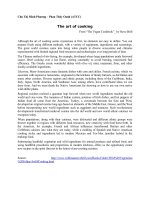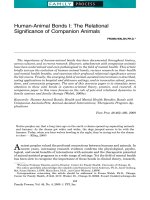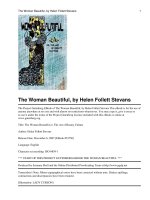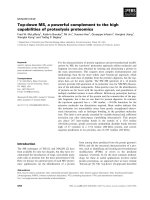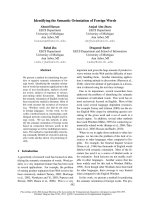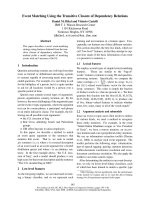The Gentle Art Of Cooking Wives pdf
Bạn đang xem bản rút gọn của tài liệu. Xem và tải ngay bản đầy đủ của tài liệu tại đây (739.11 KB, 129 trang )
The Gentle Art of
Cooking Wives
Elizabeth Strong Worthington
“If a wife is allowed to boil at
all she will always boil over.”
The Gentle Art
of
Cooking Wives
By ELIZABETH STRONG WORTHINGTON
Author of “How to
Cook Husbands,” etc.
1900
“CONSTANCE”
The Gentle Art of Cooking Wives
1
I
“G
IRLS, come to order!” shouted Hilda Bretherton in a somewhat
disorderly tone.
“How can we come to order without a president?” queried a rosy-
cheeked, roly-poly damsel answering to the name of Puddy Kennett.
“I elect Prue Shaftsbury!” screamed Hilda above the merry din of
voices.
“You can’t elect—you simply nominate,” said Prue.
“I second the motion,” said Nannie Branscome, and her remark was
instantly followed by a storm of “ayes” before they were called for,
and the president was declared elected and proceeded to take her
seat.
“Young ladies,” said she, “we are met to consider a scandalous——”
“Scurrilous,” suggested Hilda.
“——alarming article,” continued the president, “entitled ‘How to
Cook Wives.’“
“Here! here!” interrupted Hilda again, “we can’t do anything until
we’ve elected officers and appointed committees.”
“Out of a club of four members?” queried Prudence.
“Certainly. Mother said that yesterday at her club, out of eight
women they elected twelve officers and appointed seven committees
of three each. Why, you know two men can’t meet on a street corner
without immediately forming a secret society, electing president,
vice-president, secretary, and treasurer, and appointing a committee
of five to get up a banquet.”
“But to return to the subject,” persisted the president—a long-faced
girl with a solemn countenance, but a suspicious gleam in her eye.
“‘How to Cook Wives’—that is the question before the house.”
The Gentle Art of Cooking Wives
2
“‘How to Cook Wives!’ Well, if that isn’t rich! It makes me think of
the old English nursery song—’Come, ducky, come and be killed.’
Now it will be, ‘Come, ducky, come and be cooked.’ I move that
Congress be urged to enact a law adopting that phrase as the only
legal form of proposal. Then if any little goose accepts she knows
what to expect, and is not caught up and fried without
foreknowledge.”
“Young ladies,” said the president.
“Don’t mow me down in my prime,” urged Hilda in an injured tone.
“I’m making my maiden speech in the house.”
“Oh, girls, look, quick!” cried Puddy. “See Miss Leigh. Isn’t that a
fetching gown she has on?”
The entire club rushed to the window.
“Who’s she with?” asked Hilda. “He’s rather fetching, too.”
“I believe his name is Chance,” said Puddy Kennett. “He’s not a
society fellow.”
“Oh, he’s the chum of that lovely man,” said Hilda.
“Which lovely man?” asked Prue. “There are so many of them.”
“Why—oh, you know his name. I can’t think of it—Loveland—Steve
Loveland. We met him at Constance Leigh’s one evening.”
Here Nannie Branscome colored, but no one noticed her.
“Young ladies, come to order,” said the president.
“Or order will come to you,” said Hilda. “Prue has raised her
parasol—gavel, I mean.”
“There goes Amy Frisbe,” remarked Puddy from her post by the
window. “Do you know her engagement’s off?”
“Well, I’ll be jig——” Hilda began.
“Sh-h!” said the president.
The Gentle Art of Cooking Wives
3
“The president objects to slang, but I’ll still be jiggered, as Lord
Fauntleroy’s friend remarked.”
“Sh-h!” said the president.
“Girls, that reminds me,” said Puddy. “I met a publisher from New
York at the opera last night who objected to the slightest slang.”
“Oh, me!” exclaimed Hilda. “Why, where has Mother Nature been
keeping the dear man all these years?”
“On Mr. Sheldon’s editorial staff,” suggested Nannie Branscome.
“Oh, that’s too bad, Nannie,” exclaimed Prudence. “My father—and
he’s not a religious man—said the Topeka Capital was a wonderful
paper Sheldon’s week.”
“I’m not denying that,” said Nannie. “I believe it was wonderful. I
believe and tremble.”
“With other little——”
“Sh-h!” said the president, and Hilda subsided.
“Was Amy Frisbe at the opera last night?” asked Puddy rather
irrelevantly.
“No,” said Hilda, “but Arthur Driscol was. He sat in a box with the
Gorman party and was devoted to Mamie Moore all the evening. If
I’d been Mrs. Gorman I’d dropped him over the railing.”
“You don’t mean that Amy Frisbe has been jilted?” exclaimed the
president.
“I do, and it’s her third serious heart wound. Really, that girl is
entitled to draw a pension.”
“Well, I’ll be jig——” began Nannie.
“Sh-h!” said the president, and then she added: “Young ladies, it is
for you to decide how you’ll be served up in future.”
“Is it for us to decide?” asked Nannie Branscome.
The Gentle Art of Cooking Wives
4
She had a peculiar way of saying things of this sort. She would lower
her head and look out from under her head frizzles in a non-
committal fashion, but with a suggestion of something that made her
piquant, bewitching face irresistible.
“Certainly,” said the president. “The style of cooking depends on the
cook.”
“Well, let us first see what choice we have in the matter. What
variety of dishes are named? Where’s the article and where did it
come from?” asked Hilda.
“George Daly had it last night and he read bits of it between the
acts.”
“So that’s what I missed by declining Mrs. Warren’s box party
invitation!” exclaimed Hilda. “Well, let’s have the article.”
“I haven’t got it,” said Puddy. “George wouldn’t give it to me. He
said it belonged to Mr. Porter, but I copied some of it.”
“Oh, there’s Evelyn Rogers. Let’s call her in. Evelyn! Evelyn!”
Hilda was at the window gesticulating and calling.
“Young ladies,” said the president, “I’m surprised. Come to order.
Good-morning, Evelyn. We are met to consider an important
matter—’How to Cook Wives.’“
Evelyn laughed.
“Is that all you called me in for? I heard enough of that last night. It
was George Daly’s theme all the evening.”
“Were you at the box party?” asked Hilda.
“Yes, I was so silly as to go. Oh, these society people just wear me
out. I’m more tired this morning than I should be if I’d worked at a
churn all day yesterday. They’re so stupid. They talk all night about
nothing.”
“You ought to commend them for intellectual economy; they make a
little go such a long way,” said Prudence.
The Gentle Art of Cooking Wives
5
“Seriously, though, are you met to consider that piece?” asked
Evelyn.
“No,” said Puddy. “We just happened to meet, and that came up for
discussion.”
“Well, as I don’t care——” began Evelyn, laughing.
“Sh-h!” said the president.
“The publisher from New York says slang is not used in the best
circles,” said Hilda.
She recited this in a loud, stereotyped tone, giving the last word a
strong upward inflection, suggestive of a final call to the dining-
room.
“Yes, I know,” said Evelyn. “I met him at the box party last night,
and he told me so.”
“What did you say?” inquired Puddy.
“I said it must be awful to be deaf from birth.”
“Did he hear that?” laughed Hilda.
“I presume he did, for he gave me one look and straightway became
dumb as well as deaf.”
“Girls, I must be going!” exclaimed Hilda suddenly. “Really, if any
poor galley slave works harder than I do, I commend him to the
Society for the Prevention of Cruelty to Adults. I’ve already been out
to a luncheon to-day, at Mrs. Pierce’s, and Pachmann’s matinée this
afternoon, and I must go to Joe Harding’s dinner to-night——”
“Are you going to that swell affair?” interrupted Puddy. “I envy
you.”
“I don’t,” said Evelyn scornfully. “Joe Harding’s little better than an
idiot, and he’s notorious in many ways.”
“He can give swell dinners, though, and the best people are his
guests.”
The Gentle Art of Cooking Wives
6
“No, they’re not,” said Evelyn emphatically. “I’m not there and
never will be.”
“Young ladies, come to order,” said Hilda in a severe tone, “and
listen to my tale of woe. After the Harding dinner I go to the opera
with the Harding party, and then, with my chaperone, that pink of
propriety, Mrs. Warren, I attend the Pachmann reception at the
Rutherfords. Now, if your scrubwoman can name a longer, harder,
or——”
“More soul and brain enervating list,” continued Evelyn.
“I should be pleased—I mean pained to hear it,” concluded Hilda.
“And what does it all amount to?” asked Evelyn. “Will any one tell
me what you are working for?”
“A settlement,” said Nannie promptly. “I’m the only niece of poor
but impecunious relatives, and they expect me to do my best and
marry well.”
“Goodness, child!” exclaimed Hilda, “I hope you don’t tell the
brutal, cold-blooded truth in society!”
“Why, no, that isn’t it,” said Puddy. “We are going out to have a
good time.”
“Oh, you slaves and bondwomen!” exclaimed Evelyn. “You don’t
know what a good time means. I must be off. Adieu, seneschals.”
And with a pitying smile she left them.
She was a handsome, spirited-looking girl, with a queenly carriage.
As she went out of the house Constance Leigh came by, and the two
walked off together.
“There’s a pair of them,” Hilda remarked.
“Awfully nice girls,” said Nannie.
“Oh, yes, but they’re rabid. Constance Leigh is as independent as a
March hare, and Evelyn is perfectly fierce for reforms now.”
“What, a socialist?” asked Prudence.
The Gentle Art of Cooking Wives
7
“No, not exactly, but she gathers the most awful class of people
about her, and fairly bristles with indignation if one ventures to
criticise them.”
“What do you mean—criminals?” asked Prudence.
“You’d think so if you chanced to run into one of them. Why, last
Sunday evening she had an inebriate up to tea with her; next Sunday
she expects a wife-beater, or choker, or something of that sort, and
the other day, when I was coming out from a call on her, I met a
black-browed, desperately wicked-looking man—as big as a
mountain. I know he was a murderer or something. I never was so
frightened in my life. Why, I took to my heels and ran the length of
the street. I presume he was after me, but I didn’t dare look behind.”
“You needn’t have worried, Hilda,” said Prudence. “You know big
men never run after you.”
It was a notorious fact that most of Hilda’s admirers were about half
her size.
“Oh, yes. That holds good in society, but I don’t know what might
obtain in criminal circles.”
“Hilda, did your villain carry a cane and wear glasses?”
“I was too frightened to notice, but I believe he flourished a stout
stick of some sort, and I do remember a wicked gleam about his
eyes—might have been spectacles.”
The girls burst out laughing.
“Why, it’s Professor Thing-a-my-Bob, or Dry-as-Dust, or somebody
or other, from Washington. He’s her fiancé.”
“Well, I don’t care if he is,” persisted Hilda. “He’s a wicked-looking
villain.”
“Oh!” screamed the girls, and then Prudence added, with mock
solemnity:
The Gentle Art of Cooking Wives
8
“Any one who could talk slightingly of a genuine college professor
would speak disrespectfully of the equator or be sassy to the
dictionary.”
“I’d just enjoy telling the poor old proff what Hilda——” began
Nannie, but the persevering president interrupted her.
“Young ladies, you will now come to order and consider the subject
in hand.”
“Which hand? Or in other words, where’s that article? I should like
to see it,” said Hilda.
“It appeared in the Tribune, but I didn’t see it,” said Puddy, “but I
can give you some little bits, here and there, that I jotted down as
George Daly read them. Now listen.”
“Order,” said the president.
“‘First catch your fish,’“ Puddy read impressively, looking around
for approval.
“First go a-fishing, I should say,” said Hilda.
“‘Don’t hang up your fish on a hook in the housekeeper’s
department and think your work is done.’“
“That’s Hugh Millett,” murmured the president. “I don’t think he’s
been home since he returned from his wedding trip.”
“‘Start with a clear fire, not too hot. Don’t pile on all the wood and
coal at once, for if the fire burns down before your fish is done it will
be quite spoiled.’“
“Well, Mrs. Munsey is a spoiled fish, then,” said Hilda. “Don’t you
remember, Prue, how Will Munsey heaped on the lovering at first? It
was four inches deep—lovey this and dovey that till it fairly cloyed
one. But the fire went out long ago. There’s no spark or sparking on
that hearth now.”
“‘Don’t think, after the cooking is well under way, that you can leave
it to take care of itself.’ I had something more,” said Puddy,
The Gentle Art of Cooking Wives
9
fumbling in her reticule for another bit of paper. “Oh, here it is:
‘Don’t stuff your fish with dried crusts composed of the way your
mother used to do this.’ And here’s another: ‘Some husbands, after
making it so hot in private that their poor wives are nearly reduced
to a cinder, serve them up in public with a cold shoulder. Others toss
them carelessly into a kettle to simmer from morning till night over
the nursery fire.’“
“I’m going,” said Nannie abruptly, and without further ceremony
she departed, just as Evelyn Rogers came in again.
“Nannie Branscome is a perfect——” Hilda began.
“Sh-h!” said the president.
“Well, I trust she’ll settle in a heavily wooded country, for the
cooking she’ll require before she’s palatable would break a
millionaire if fuel was dear.”
“Oh! she’ll do well enough when she has her growth,” said Prudence
in her dry way.
Nannie’s growth was a subject of jest among her mates. At sixteen
she suddenly thrust her foot forward into womanhood with saucy
bravado, as it seemed. At seventeen she snatched it back—pettishly,
some said, but there were those who looked deeper, and they
discerned a certain vague terror in the movement—a dread of the
unknown. Since that time—almost a year now—Nannie had been
hovering on the border line, something like a ghost that has ceased
to be an inhabitant of this world and yet refuses to be well laid.
“Now listen to this, girls,” said Puddy, who was intent on reading
her excerpts to the bitter end. “‘If a wife is allowed to boil at all, she
always boils over.’“
“It would require a high temperature to boil you, Hilda,” said
Prudence with a laugh, for Hilda’s good-nature had passed into
proverb.
The girl looked down from her five feet nine inches of height with
her easy, comfortable smile.
The Gentle Art of Cooking Wives
10
“Why? Because of my altitude?” she asked.
“‘And you will be sure to scald your fingers and get the worst of it,’“
Puddy went on relentlessly.
This struck Evelyn’s fancy and she exclaimed:
“Girls, I can just see Nannie’s husband sitting in the doorway of their
cabin blowing his fingers and wincing.”
“Can you?” said a voice, and the girls started as they saw Nannie
standing between the curtains of the folding doors.
Sometimes she resembled an elf in her weird beauty; just now she
looked more like an imp.
Something disagreeable might have ensued, for Nannie’s temper
was uncertain and undisciplined, but Prudence said in a presidential
tone:
“Young ladies, it is for you to decide how you will be served up in
future. Will some one please make a motion?”
“Oh, let’s decide how each other will be served,” said Hilda. “You
know at church nobody applies any of the sermon to himself, but fits
it all on to his neighbors.”
“Evelyn will be raked over the coals,” said Nannie in a low, intense
voice.
Evelyn’s handsome face flushed and her lips parted for a retort, but
Hilda exclaimed:
“Puddy will be made into delicious round croquets,” and she
smacked her lips with anticipatory relish.
“Hilda’ll be kept in a nice continual stew,” retorted Puddy.
“Nannie’ll be parboiled, fried, fricasseed——” began Hilda, but
Nannie exclaimed:
“No, I’ll be roasted—you see if I’m not!”
The Gentle Art of Cooking Wives
11
“Prue will be baked in a genteel, modern way,” said Evelyn.
“Yes!” shouted Hilda, to get above the noise. “Girls, mark my words.
Some day Mr. Smith, Brown, or Jones, whoever he is, will invite us
all to a clambake, and when we arrive we’ll find it’s just dear old
Prue served up.”
This hit at Prudence’s usual silence struck the company forcibly, and
after a little more from the recipe they broke up with noisy mirth.
On the doorstep Nannie paused and looked about her. Puddy’s last
extract from the article under discussion was wandering through her
brain, something as a cat wanders through a strange house.
“Order a dressing as rich and as plentiful as you can afford.”
Nannie understood this well enough. She was wearing such a
dressing at that very moment, but the next sentence puzzled her.
“If you can’t afford the best, heap your fish with crumbs of comfort.
Press some of these into pretty shapes, such as hearts, and roses, and
true lovers’ knots. If you have neither the patience nor the skill to
follow these directions, take my advice and don’t go a-fishing.”
Nannie had never received a caress at home in her life and very few
abroad, for she was not one to form close friendships among the
girls. Her parents had died before she could become acquainted with
them, and the aunt who had reared her was a worldly woman who
looked upon her merely as a valuable piece of social property.
Nannie’s lack of popularity was disappointing, but the aunt still
hoped that her unusual beauty would atone for her brusqueness,
crudity, and lack of tact, and she would form a rich alliance. Between
her aunt and uncle there had never been, to Nannie’s knowledge, the
slightest expression of affection, and so when one spoke of “hearts
and roses” and “true lovers’ knots” in a domestic connection, the
words fell strangely upon the girl’s ears.
The sun was streaming through the trees that lined the broad,
handsome avenue as the merry group broke up. Happy children,
their dear little bodies tastefully clothed and their dear little faces
wreathed in smiles, flitted about here and there at play, like pretty
The Gentle Art of Cooking Wives
12
elves. Now and then some one or more of them would run, with
shouts of glee, to welcome a home-coming father.
In the heart of a more womanly, more happily trained girl, all this
would have awakened tender yearnings. It awakened a feeling in
Nannie’s heart—just what it meant she could not have told—but this
vague, unused something was soon swept one side by a more
comical image. As she looked at the handsome dwellings she seemed
to hear a voice calling:
“Wives for dinner! wives for dinner!”
And from the household altars there rose the smoke of unique
dishes—domestic fries, feminine roasts, conjugal stews, in highly
colored family jars.
“Come, ducky, come and be cooked!” sounded in her ears.
“No, I thank you,” said Nannie audibly.
And she hurried down the avenue.
The Gentle Art of Cooking Wives
13
II
O
NE evening a few weeks previous to the formation of the Young
Woman’s Club—for an infant society of that name dated from the
burlesque meeting just described—Randolph Chance was seated in
the room of his nearest friend and was talking over the events of the
day. Ordinarily he was not free of speech, but with this man he
could think aloud. There are folk whose very presence is enough to
shut one up with a snap as the wrong touch closes the shell of a
clam; there are others who act upon us as heaven’s own sun and dew
act upon the flowers.
For a time after Randolph had taken his accustomed seat—an old
chair in an ingle-nook of the fireplace—he was silent, possibly
through physical disability, for there was no elevator at night, and
nine flights of stairs is not provocative of conversation; or he may
have been awed into silence, for he often told Steve that he was
nearer heaven than he would ever be again in all probability. Be that
as it may, he sat there enjoying his thoughts and the restful
atmosphere of the room. Quite unlike a bachelor’s apartment, this; as
unlike as many another belonging to that particular branch of the
genus homo—rooms in which we would probably receive a mild
shock and be compelled to rebuild our entire structure of theories on
the subject of the helplessness, uncomfortableness, and general
miserableness of that specimen known as bachelor. To be sure, Steve
Loveland was fortunate in the selection of his rookery, but that
might be called an outcome of his genius—a genius with which
bachelors are not supposed to be blessed. At first glance, one who
had no such gift for situation would not have considered such a spot
favorable for the construction of a home—if this word may, for a
moment, be snatched from the wedded portion of the human race—
but the artist in Steve recognized its possibilities.
Carnot Fonnac, who originally reared and owned the building under
discussion, was himself a wretched, reprehensible bachelor, but
being also a Frenchman he possessed some taste; and intending to
make his abode in the sky-parlor of his structure, he so planned it
The Gentle Art of Cooking Wives
14
that there was a hint of grace and beauty in its arches and
dimensions, as well as of expanse. An English friend suggested the
fireplace, and he had the good sense to act upon this most sensible
advice. After Fonnac’s death his building went into retirement, so to
speak; fashion minced off in another direction and left it to its grief,
so now, at the remove of some fifteen years, Steve Loveland obtained
the rental of the attic for a mere song, and here he cast his lot, for he
was his own housekeeper. A few screens skillfully arranged reduced
the apparent size of the apartment; some old-fashioned furniture his
mother spared him made it homelike and comfortable; an air-tight
stove on the one side (there were two chimneys) held Boreas at bay,
while on the other a little basket grate of coals, setting like a ruddy
gem in the center of the ample fireplace, was at once an element of
good cheer and a respecter of the law of economy.
On this particular evening the cronies sat in their accustomed places
within the fireplace, one on either side; a little stand, on which were
set a couple of plates of crackers and cheese, stood near by, and a pot
of oysters, cheerily simmering, hung from the crane above the fire.
Randolph was silent; so was Steve—the latter never talked; in place
of words he used the poker—not in any fiendish way; heaven forbid!
but in a mild, unobtrusive manner, intelligible only to himself and
Randolph. In this system of fireworks stenography, so to speak, a
series of slow, deliberate pokes under the fire implied
contemplation; poking down from above stood for disagreement;
while thrusts of the poker between the ribs of the grate expressed
sympathy or agitation.
“Steve,” said Randolph—his chair was tilted against the brick side
wall of the chimney, and he was leaning back, with his hands
clasped behind his head—”I tell you she’s a pretty nice girl; an
awfully sensible girl; one of the kind that sets your brain to jogging.
It’s easy to talk to her, she’s so suggestive, wide awake, and at the
same time she’s restful, too. She’s none of your hoity-toity characters,
one thing one day and another the next, so you never know where
you stand with them. You can feel secure with her. I feel as if I had
known her all my life; there’s the most perfect understanding
between us; we don’t have to talk; I think she knows my thoughts,
The Gentle Art of Cooking Wives
15
and I’m certain I know hers. Awfully nice girl; one of the nicest I
ever knew.”
“Must be,” said Steve gently.
After this there was some talk of a desultory sort, some solicitous
watching of the oysters that were singing softly preparatory to
boiling, and then Randolph bethought him of a conversation he
overheard on the train that day and repeated it to Loveland, who sat
bending over toward the fire, his elbows resting on his knees and
poker in hand ready for action.
“I tell you, Steve, it sets one thinking to get at the woman’s side of
the matter,” said Randolph. “I’ve been idiot enough to suppose they
thought just as we do on most subjects.”
Loveland smiled and poked the fire gently from above.
“You know we’ve always been taught that women were naturally
dependent, and I supposed it was second nature for them to receive
money from their husbands, and so they got enough they cared no
more about it. Do you think many of them feel like that woman in
the car?”
Loveland poked the fire from beneath and then sighed helplessly.
“Can’t say, I’m sure,” he replied in his gentle, hesitant way. “They
don’t seem to go according to tradition in anything, so far as I’ve
noticed. They’re a peculiar race.”
“Oh, I don’t know about that,” said Randolph in a practical tone.
“It’s pretty easy to understand, once your attention’s called to it. I’d
never given the subject any thought, but if one chooses to observe he
can very soon find out what’s what. Some men are idiots and won’t
learn, so they get in a mess.
“It’s natural for you to be mystified, Steve,” continued Randolph
after a short pause, “but you see I have a sister and I know all about
women. You can judge of the rest by any one of them. They’re pretty
much alike.”
Loveland gave the top of the fire a few little jabs.
The Gentle Art of Cooking Wives
16
“Yes, I know,” said Randolph. “You have mother and sister both, but
you haven’t lived with them for years. If you don’t actually live in
the same house with women you can’t know them. Of course even
then you may be in the dark on a point or two, as I was on the
money question, but you can soon learn. All a woman wants is fair
treatment. If a man drinks and makes a beast of himself or sulks
around in place of telling her what he don’t like and letting her
change it, of course she isn’t going to be happy. It’s easy as rolling off
a log to manage a woman.”
Loveland rose and thrust the poker down through the top crust of
the fire and left it standing there.
“As far as management goes,” Randolph went on unheedingly,
“leaving morality, and expense, and all that out of the question, I’d
just as soon turn Mormon and marry forty women.”
Here Loveland stabbed the fire clear through the body, bringing the
poker out on the under side and against the hearth with a force that
bent its glowing point.
“The stew’s done,” he said. “We’ll dish up now.”
This little scene, or rather the conversation that seasoned the stew,
soon faded from Randolph’s memory, but it lingered in the mind of
his companion. Men like the latter, little given to speech, are apt to
turn and re-turn in thought what has been said to them, and
therefore do not easily forget.
Several weeks after this the two men sat on the bachelor hearth once
more; Loveland in his usual quiet mood and Chance smarting from a
recent wound. He had begun to feel that his position was almost
secure with Miss Leigh, but that day, on the occasion of a picnic at
which he had amused himself by trifling with a silly young girl, he
was amazed, mortified, and hurt by receiving the cold shoulder
when he proffered his company to Miss Leigh on the way home.
His friend’s hospitable hearth had more than once proven a refuge
and a solace. It was so to-night, and Randolph began to take heart
again as he settled back in his comfortable chair in the ingle-nook
and watched the hanging of the oyster stew upon the crane.
The Gentle Art of Cooking Wives
17
For a time the gentle simmering of the appetizing dish was the only
sound to be heard. Randolph did not feel like talking or even
listening, and his companion knew how to hold his peace.
Steve Loveland was one of those men whose intuitive sense is as fine
as a woman’s; of delicate physique, strong brain, and a sensitive
temperament that might have gone off on a morbid tangent but for
the common sense, cheerfulness, and unselfishness that held it true
to the course. The last man in the world to lead a lonely life, but
there was an invalid mother and a delicate sister in a pretty little
country town home some two hundred miles away, and that was
why Steve had no home of his own. Loving nature as I think most
men of fine, sensitive fiber do, yearning for wife, and children, and
hearthstone, as every good man must, he had cheerfully and forever
put one side all hope of fulfilling these holy dreams and had taken
his place on the force of a daily paper, never thinking he was a hero.
His comrades never thought of that, either; they only knew that he
was always pleasant, always considerate, always every inch a man,
and they loved him with one accord.
It was to such a friend as this that Randolph had given his heart, for
although he did not fully understand him, he loved him, and the
answering affection he received was one of the most beautiful of
tributes to his own fine qualities.
When Randolph was ready to talk he told the story of the day—its
hope, its disappointment, and humiliation.
“It beats the Dutch, Steve. I can’t think what was the matter. There
wasn’t a thing I did or a word I said to make her behave so.”
Steve was softly poking the fire from above. The night was quite cool
for June.
“No, there was not,” Randolph reaffirmed. “I’ve gone over the whole
day again and again. I didn’t give her the least excuse. What do you
suppose was the matter with her?”
Steve looked up with an almost startled air.
“Oh, I’m sure I can’t say. They’re quite beyond me.”
The Gentle Art of Cooking Wives
18
“They’re beyond every one,” said Randolph in the tone of a Supreme
Court judge. “I don’t see what the Lord made them for.”
Steve looked up again and there was the least suspicion of a twinkle
in his eye.
“How is it,” he asked in his gentle way—”how many of them is it
you are prepared to manage?”
Randolph brought his chair down on its four legs.
“Not a confounded one!” he said.
The Gentle Art of Cooking Wives
19
III
F
OR a time Randolph Chance was fairly dazed by the suddenness
with which his fortune changed. Yesterday it was down—deep
down; to-day it had gone flying up. He had followed Constance
Leigh when she walked to the lake in the afternoon; had helped her
from a perilous place in the midst of rough winds and still rougher
waves; and as he took her from the pier their eyes had met, and this
was why, later on, he sat by his friend’s fireside in a state of
bewildered rapture.
An outsider, one of the world’s common folk, would have made but
little out of Randolph’s brief, rough-hewn sentences. But Loveland
was finely strung; he understood.
“I can’t forget that look. It breaks me all up every time I think of it.”
Randolph spoke like a man who was talking to himself.
“It’s so unreal—I may have dreamed it,” he went on slowly. “I tell
you, Steve”—this with a sudden turn—”I don’t dare to hope, but if—
—”
There was no perceptible tremor in his voice, but the sentence broke
sharply.
“I know, old man, I know,” said Steve in his gentlest voice.
And he poked the fire softly between the ribs of the grate.
It seemed that Randolph’s hope was not without foundation, for
after he had been the toy of fate somewhat longer he came to Steve
one night with great news, and yet no news to Steve, who had long
discerned the signs of the times and had been dreading what he saw
must come. Now, although he felt sharp pangs of grief on seeing his
boon and sole companion snatched from him and about to be offered
up upon the altar matrimonial, yet he rejoiced thereat with the full
force of his unselfish nature.
The Gentle Art of Cooking Wives
20
On this especial night the two men sat beside the fire, and also
beside some of the last oysters that would ever be served up with the
spicy sauce of this same good comradeship. As befitted so
memorable an occasion, the oysters were big fellows and were frying
gloriously.
Randolph, who was in great good spirits, leaned over and lifted
them carefully with a fork he held in hand.
“Here we are!” he exclaimed. “Things are done brown now!”
Then the two men looked up at each other and burst out laughing.
There was one important ceremony which Randolph felt must
precede the marriage service, and that was the introduction of his
bosom friend to his fiancée.
“I’ve been puzzling my brains to think how I can bring this about,”
he said to Constance one day. “I’ve already hinted at it to Steve, but
he don’t take. I know he wants to meet you, but he’s such a retiring
fellow—not really bashful, but like a clam in his shell.”
“Don’t distress yourself, I beg of you,” said Constance with a
mischievous smile. “Mr. Loveland and I have already met and are
now the best of friends.”
Randolph stared at her in open-mouthed amazement.
“Where?” he managed to ask.
“Right here in this parlor. I must tell you about it—it was most
beautiful. His card took me by surprise, but I supposed you had
brought him. When I came downstairs there he was, looking
altogether different from your descriptions.”
“Well, I like that!” said Randolph. “Do you mean to impeach my
statements?”
“Altogether better,” persisted Constance. “Yes, he is taller and has a
most interesting face. He came forward to greet me without a
particle of embarrassment, and there was something so manly and
The Gentle Art of Cooking Wives
21
simple, and withal so high-bred in his every movement, that I was
charmed. I know he must come of a fine family.”
“Oh, he does. He had a line of ancestors a mile long aboard the
Mayflower. A cousin of his was telling me. He never said a word. He
never talks.”
“Ah!” said Constance with an arch smile. “He talked that evening, I
assure you, and to good effect. He had but a few moments to stay,
but he made every moment tell. For one thing, he assured me, with a
most winning smile, that he should feel constrained to rise in church
and forbid the banns unless I promised to adopt him as a brother.”
Randolph’s eyes and mouth opened again.
“Perhaps you’d better adopt him as something still nearer!” he said,
with a pretense of anger.
“Now that you mention it,” Constance replied in a confidential tone,
“I came very near doing so. The only reason I did not was that he
forgot to ask me.”
Randolph broke into a laugh. Then he added in a puzzled tone:
“Well, it beats everything! In all the ten years I’ve known him I’ve
never heard him say as much as that!”
“I can’t repeat all he said——” Constance began again.
“What!” Randolph cried with another semblance of jealousy.
“No, because it lay in his manner; that gentle, affectionate, yet manly
manner—indescribable! perfectly indescribable!”
“It’s the same to everybody,” said Randolph, “and everybody loves
him. I never knew another such fellow. It’s past belief the way he
wins people. And he says nothing, too.”
“Ah, but he does!” repeated Constance. “Well, well, there’s no telling
it all. I continually think of the word delightful in recurring to it and
him. I assured him that he would be a member of our family, and
that our fireside and our crust—I really didn’t dare to promise more
